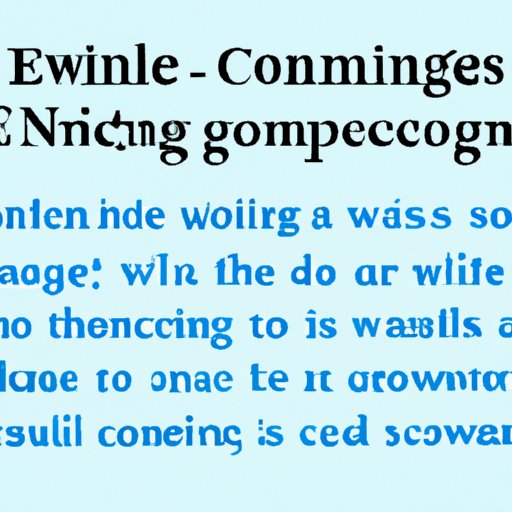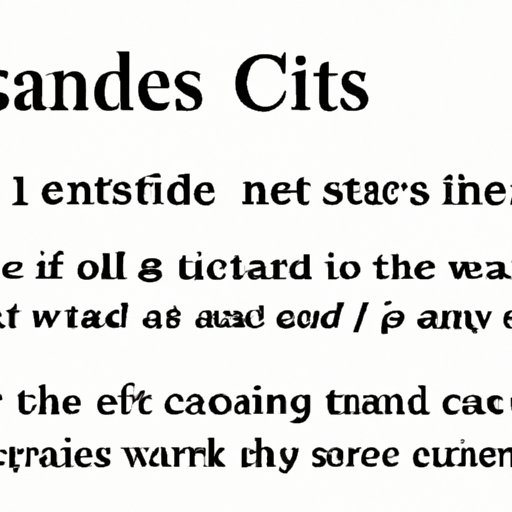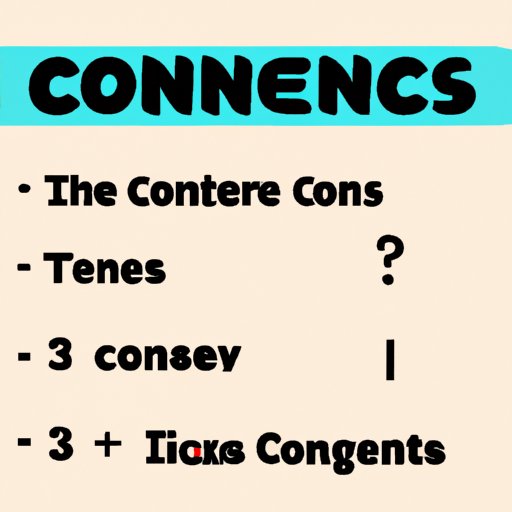Introduction
Conciseness in writing is a key element of effective communication. It involves expressing ideas in a concise manner while still conveying the intended meaning. This article will provide a guide to understanding what conciseness in writing is, how it can be achieved, and why it is important.

Exploring Conciseness in Writing: A Guide to Clear and Effective Writing
The ability to write clearly and concisely is an essential skill for anyone who wishes to communicate effectively. Whether you’re writing a novel or an email, mastering the art of conciseness can help you get your point across more efficiently and effectively.
What is Concise Writing?
Concise writing is the process of expressing ideas in a brief and clear manner. It involves using only the necessary words to convey the desired message without sacrificing clarity and accuracy. This type of writing is often preferred by readers because it is easier to understand and less time consuming to read.
The Benefits of Concise Writing
Writing concisely has numerous benefits, including:
- It makes your writing easier to understand and more enjoyable to read.
- It saves time, as readers don’t have to wade through unnecessary information.
- It is more effective at conveying your message.
- It helps to keep your writing focused and on track.
How to Achieve Concise Writing for Maximum Impact
Achieving maximum impact with concise writing requires practice and patience. Here are some tips for perfecting the art of concise writing:
Perfecting the Art of Concise Writing
- Edit ruthlessly. Cut out any unnecessary words or phrases that don’t add value to your writing.
- Avoid redundancies. Don’t repeat yourself or use multiple words to express the same idea.
- Be direct and to the point. Use active voice and avoid long-winded sentences.
- Choose your words carefully. Use precise language and avoid jargon or cliches.
Concise Writing Techniques for Busy Professionals
- Outline your thoughts before writing. This will help you focus on the main points and save time when writing.
- Write short paragraphs. Use 1-3 sentence paragraphs to break up large blocks of text and make it more readable.
- Use lists and bullet points. This is an effective way to organize information and make it easier to digest.
- Edit as you go. Don’t wait until the end of your writing session to edit; instead, take time to refine your work as you progress.

Crafting Clear and Concise Sentences: Tips and Strategies
Writing concise sentences is an important part of achieving clarity and precision in your writing. Here are some tips and strategies for crafting clear and concise sentences:
Tips for Making Sentences Concise
- Keep it simple. Avoid complex words and phrases and use simple language whenever possible.
- Choose the right words. Use the most specific and accurate words to express your ideas.
- Eliminate wordiness. Cut out any unnecessary words or phrases that don’t add value to your sentence.
- Avoid passive voice. Active voice is more direct and will make your sentences more concise.
Common Mistakes to Avoid
- Using too many adjectives and adverbs. These words can add unnecessary length to your sentences.
- Using double negatives. This can make your sentences confusing and difficult to understand.
- Using too many clauses. Try to keep your sentences as simple as possible.
- Using redundant phrases. Make sure each phrase adds something new to your sentence.
Conclusion
In conclusion, conciseness in writing is an important skill that should not be overlooked. It involves expressing ideas in a concise manner while still conveying the intended meaning. Writing concisely has numerous benefits, including making your writing easier to understand, saving time, and being more effective at conveying your message. To achieve maximum impact with concise writing, one must practice and utilize techniques such as editing ruthlessly, avoiding redundancies, and using precise language. Finally, crafting clear and concise sentences involves using simple language, choosing the right words, and eliminating wordiness.
By following these tips and strategies, you can become a more effective communicator and improve your writing skills. Whether you’re writing a novel or an email, mastering the art of conciseness can help you get your point across more quickly and effectively.
Summary of Key Points
- Conciseness in writing involves expressing ideas in a concise manner while still conveying the intended meaning.
- Writing concisely has numerous benefits, including making your writing easier to understand, saving time, and being more effective at conveying your message.
- To achieve maximum impact with concise writing, one must practice and utilize techniques such as editing ruthlessly, avoiding redundancies, and using precise language.
- Crafting clear and concise sentences involves using simple language, choosing the right words, and eliminating wordiness.
Final Thoughts
In the digital age, conciseness in writing is becoming increasingly important. By mastering the art of conciseness, you can become a more effective communicator and improve your writing skills. With practice and dedication, you can learn to write clearly and concisely, ensuring that your message is always understood.
(Note: Is this article not meeting your expectations? Do you have knowledge or insights to share? Unlock new opportunities and expand your reach by joining our authors team. Click Registration to join us and share your expertise with our readers.)
